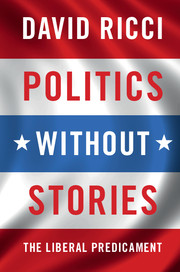Introduction
Published online by Cambridge University Press: 05 August 2016
Summary
Imagine this scene. Hillary Clinton is giving a campaign speech sometime during 2016. She is energetically addressing a crowd of people who hold up signs that say “Fighting For Us.” She wants to become President of the United States of America. It is a worthy ambition.
Quick, now. No fudging. Do you know what she stands for as a candidate? Do you know which values she admires? Do you know how she thinks the country is doing now and where it should go in the future? Or, to restate the matter, does Clinton, who hopes that American citizens will elect her to the White House in November 2016, believe in a great and inspiring story about herself and the community to which she belongs? And has she projected that story so clearly and forcefully that you know all about it? And has she shared that story with other members of the Democratic Party, to the point where she and they stand together?
If you answered all these questions with: “Well, give me a moment to think about that,” you have met the liberal predicament. Hillary Clinton did not create that predicament. But it exists, it hinders her campaign, and it will live on after she leaves public life. Her competitor in the Democratic Party this year, Bernie Sanders, does not seem to labor under the same disadvantage. But that is a point to which I will return in a Postscript added to Politics Without Stories just before going to press.
The Liberal Predicament
The liberal predicament flows from a storytelling gap in American politics. Conservatives tell long-term political stories while liberals do not. Instead, liberals promote immediate policy proposals. Therefore, rightists such as Ronald Reagan – actor, television host, and politician – proclaim that, now and forever, from long ago and far into the future, markets are terrific, tradition is wonderful, and government, for the most part, should be small. At the same time, leftists such as Paul Starr – professor, sociologist, and co-editor of The American Prospect – insist, in recent years, with considerable passion, that modern medical care, a complicated business with costs and administration that no one understands entirely, should be regulated according to the Patient Protection and Affordable Care Act of 2010.
- Type
- Chapter
- Information
- Politics without StoriesThe Liberal Predicament, pp. 1 - 10Publisher: Cambridge University PressPrint publication year: 2016



